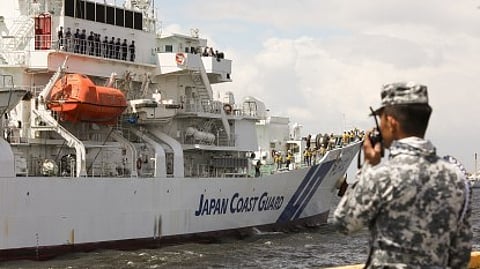
- NEWS
- the EDIT
- COMMENTARY
- BUSINESS
- LIFE
- SHOW
- ACTION
- GLOBAL GOALS
- SNAPS
- DYARYO TIRADA
- MORE

The Philippines is collaborating with the United States and Japan to keep the West Philippine Sea (WPS) free and safe amid the ongoing tensions between Filipino and Chinese maritime forces in the disputed waters.
Philippine Coast Guard Commandant Admiral Ronnie Gil Gavan, who attended the recent International Institute for Strategic Studies (IISS) Shangri-La Dialogue: 21st Asia Security Summit held in Singapore, called on the Japan Coast Guard (JCG) and the United States Coast Guard (USCG) to develop innovative strategies to address the imminent threat in the high seas, particularly China’s assertion of authority over non-Chinese fishermen.
“We intend to deploy our ships further out, in coordination with other agencies, to enhance the protection of Filipino fishermen,” said Admiral Gavan.
“I advocate for increased presence in the high seas. While we will play our part, we also rely on your support to uphold the rules-based order, a crucial role for Coast Guards,” he added.
Admiral Gavan acknowledged PCG’s limitations but believes it can contribute to providing a window for diplomatic efforts to safeguard freedom of navigation at South China Sea.
SCS overlaps WPS.
In April, China announced its authority over the Spratly Islands and the Paracel Islands, designating them as part of its “Nansha” and “Xisha” districts under the administration of Sansha City, located on Hainan Island’s southern tip.
The Philippine government, through the Department of Foreign Affairs, has consistently protested against China’s establishment of Sansha City since 2012, rejecting its jurisdiction over Philippine territory and maritime zones in the WPS.
Regarding support from Japan, the JCG commended the PCG’s principled stance and proposed increasing personnel exchanges to strengthen cooperation in maritime law enforcement and upholding the rule of law.
Meanwhile, the US Coast Guard pledged to deploy its North Pacific Coast Guard to assist the PCG in defending its sovereign rights in the WPS. This includes conducting additional training, devising dynamic tactics, and equipping ships to counter emerging threats on the high seas.
